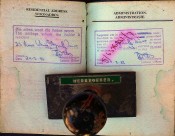A Lot consisting of two Apartheid Era's most hated Items', a 'pass book' or 'Dompas' as it was commonly known, and an original 'Dompas' - 'Werksoeker' rubber stamp.
Following Nelson Mandela's example of burning of his own 'Dompas' on March 28, 1960, in protest to the atrocities at Sharpeville, many millions of the infamous 'Dompas' were destroyed in similar fashion, both during the apartheid era in protest to the ongoing atrocities, and also post apartheid in celebration of a new and Free South Africa. As a result, but few remain in existence today.
This then is 'pass book' that belonged to a 49yr Xhosa lady from Graaff Reinet. The 'Dompas'-'Work Employment Officer's' rubber-stamp included in this Lot is the stamp used by the Richmond C.P. District Council.
The Natives (Abolition of Passes and Co-ordination of Documents) Act, 1952, commonly known as the Pass Laws Act, made it compulsory for all black South Africans over the age of 16 to carry a 'pass book' at all times within white areas. The law stipulated where, when, and for how long a person could remain. This pass was also known as a 'Dompas'.
The document was similar to an internal passport, containing details on the bearer such as their fingerprints, photograph, the name of his/her employer, his/her address, how long the bearer had been employed, as well as other identification information. Employers often entered a behavioural evaluation, on the conduct of the pass holder.
An employer was defined under the law and could be only a white person. The pass also documented permission requested and denied or granted to be in a certain region and the reason for seeking such permission. Under the terms of the law, any governmental employee could strike out such entries, basically cancelling the permission to remain in the area.
A pass book without a valid entry then allowed officials to arrest and imprison the bearer of the pass. These passes often became the most despised symbols of apartheid. The resistance to the Pass Law led to many thousands of arrests and was the spark that ignited the Sharpeville Massacre on 21 March 1960, and led to the arrest of Robert Sobukwe on that same date.
- Sold By: Booktown Africana
- Contact Person: Chris Shelton
- Country: South Africa
- Email: [email protected]
- Telephone: 0685615292
- Preferred Payment Methods: Internet banking transfer (EFT), PAYPAL. Regret no Credit Card facility.
- Trade Associations: AA Approved
















